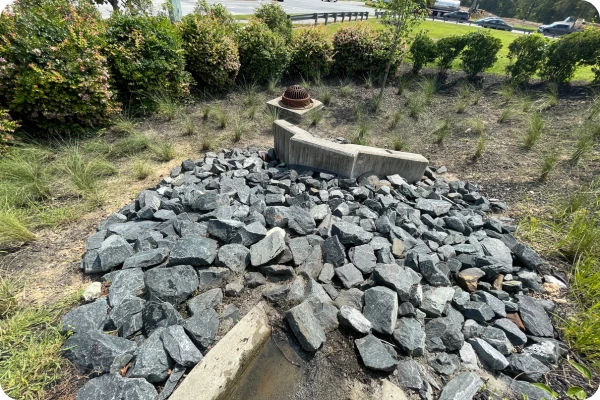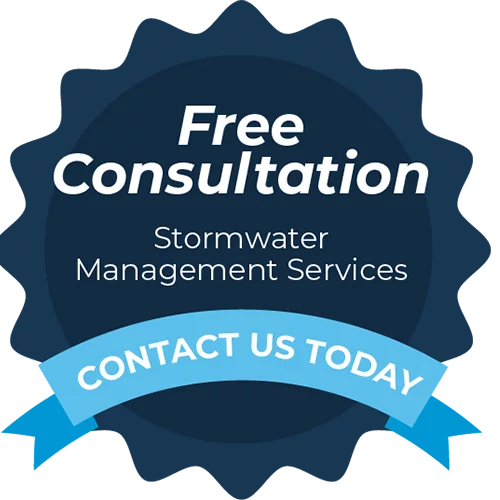Managing stormwater effectively is crucial for commercial properties, communities, and construction sites. However, common misconceptions about stormwater systems can lead to costly mistakes, non-compliance, and environmental harm. Let’s debunk the top myths about stormwater management to ensure your property or project is protected and compliant.

Myth #1: Stormwater Systems Are Only Important During Storms
Reality: Stormwater systems do much more than handle rainfall during storms -they manage runoff, filter pollutants, and prevent erosion year-round. Even during dry weather, debris, sediment, and pollutants can accumulate in stormwater infrastructure, reducing its capacity to handle heavy rain. For example, clogged drains and overfilled basins often result from months of neglect, not sudden rainfall.
Take Action: Schedule regular inspections and cleanings to ensure your stormwater system is always ready, regardless of the weather.
Myth #2: My Property Doesn’t Flood, So Stormwater Systems Aren’t a Priority
Reality: Flood prevention is just one role of a stormwater management system. Even if your property doesn’t experience flooding, neglecting stormwater systems can lead to other issues, such as erosion, water contamination, and structural damage to property foundations. Additionally, local regulations often require property owners to have functioning systems to minimize runoff pollution.
Why It Matters: Stormwater runoff carries oil, chemicals, and debris into local waterways, leading to potential legal and environmental consequences.
Myth #3: Maintenance Is Optional for Stormwater Systems
Reality: Skipping maintenance isn’t just risky – it’s often against the law. Stormwater systems are subject to local, state, and federal regulations, and non-compliance can result in hefty fines. Beyond regulatory issues, a poorly maintained system can overflow, causing water damage, and require costly repairs or replacements.
Key Tip: Work with a professional stormwater management company to establish a maintenance plan that includes inspections, cleanings, and repairs. Proactive maintenance is always more cost-effective than reactive fixes.
Myth #4: Stormwater Leaves My Property, So It’s Not My Responsibility
Reality: Even after stormwater runoff leaves your property, you may still be liable for its environmental impact. Regulations like the Clean Water Act require property owners and contractors to prevent contaminants from entering local water systems. Failure to implement proper stormwater best management practices (BMPs) can lead to costly fines.
Best Practices: Install and maintain BMPs such as silt fences, retention basins, and vegetative buffers to control runoff and improve water quality.
Myth #5: Retention and Detention Ponds Are ‘Set It and Forget It’ Systems
Reality: Retention and detention ponds are vital for managing stormwater, but they are not maintenance-free. Over time, sediment builds up, vegetation overgrows, and structural components deteriorate, reducing the pond’s effectiveness. Without regular care, these ponds can fail during heavy storms, leading to flooding and compliance violations.
Maintenance Checklist:
- Inspect for sediment buildup quarterly.
- Manage invasive vegetation to maintain proper water flow.
- Check for cracks or leaks in outlet structures.
Bonus Tip: Partnering with a stormwater management provider ensures proper upkeep and regulatory compliance for these systems.
Myth #6: Erosion Control Measures Are Unnecessary for Established Properties
Reality: Erosion isn’t just a concern for construction sites – it’s an ongoing issue for commercial properties, HOAs, and developments. Without proper stabilization, exposed soil can erode, sending sediment into stormwater systems. This not only reduces system efficiency but can also lead to costly repairs and environmental violations.
Solutions to Consider:
- Hydroseeding: Quickly establishes vegetation to stabilize soil.
- Erosion Blankets: Protect slopes and high-traffic areas from runoff damage.
- Check Dams: Slow down water flow in channels, reducing sediment transport.
These measures save money over time by preventing damage and ensuring compliance with erosion control regulations.
Myth #7: DIY Stormwater Management Can Save Costs
Reality: While it might seem cheaper to handle stormwater management in-house, the complexity and regulatory requirements often make professional help essential. Certified stormwater experts understand local laws, system design, and maintenance best practices, ensuring that your property avoids fines and stays compliant.
Hidden Costs of DIY:
- Improper maintenance can lead to system failures and costly emergency repairs.
- Non-compliance with regulations can result in fines or project delays.
- Lack of expertise may lead to missed opportunities for system optimization.
Why Professionals Matter: Partnering with a stormwater management company provides peace of mind, protects your property, and ensures long-term savings.
Take the Next Step in Stormwater Management
Understanding and addressing these myths is critical for commercial property owners, HOA and property managers, and contractors. Avoiding misconceptions helps you protect your property, maintain compliance, and contribute to environmental sustainability.
At iSTORMWATER, we provide tailored solutions to meet your stormwater needs. Whether you require system design, inspections, regular maintenance or repairs, our experts are here to help.
Call us today at (410) 231-3455 or contact us online to schedule a consultation and ensure your stormwater systems are ready to perform at their best.
Real Results
iStormwater LLC was an excellent choice. They made the process of the Stormwater pond repairs seamless. They took charge of the project and got the project approved and passing the inspection. We highly recommend them and would use them again.
Incredible stormwater management service. The owner John consulted on a property I manage and ended up saving us thousands of dollars in environmental fees from the government. Now, our property is compliant with the EPA and we have a great partner to keep us maintained on stormwater regulations over time.
So helpful with all of my water issues.
Great communication and leadership and a family friendly atmosphere. Thank you John!
Stormwater and wastewater are often mentioned together, but they serve very different roles in protecting infrastructure, waterways, and regulatory compliance. For property managers, facility owners,...
- Annapolis
- Anne Arundel County
- Baltimore County
- Baltimore
- Bel Air South
- Bethesda
- Bowie
- Cecil County
- Charles County
- Columbia
- Gaithersburg
- Glen Burnie
- Howard County
- Montgomery County
- Pasadena
- Prince George’s County
- Rockville
- Severna Park
- St. Mary’s County



